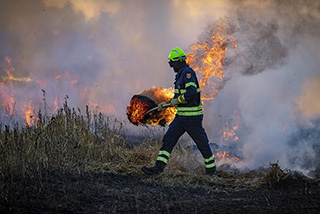Canada On Fire

Karsten and Taylor discuss Canadian wildfires. The English grammar (in light purple) focuses on Imperatives.
Karsten: “Smoke is coming down from Canada and fouling our air.”
Taylor: “I know, but there is nothing you can do about it.”
Karsten: “Maybe there is. Maybe file a lawsuit or something.”
Taylor: “I saw an article that said more than 800 fires are still burning out of control up there.”
Karsten: “I know, and the smoke is drifting all the way to Florida.”
Taylor: “I don’t see how that is possible.”
Karsten: “High-pressure systems carry the smoke over the Atlantic and south to Florida. Apparently Miami had dark, hazy skies.”
Taylor: “Wow, think about people with asthma. Weather channels say this air quality is unhealthy.”
Karsten: “Of course it is. It’s already bad enough with cars.”
VOCABULARY WITH IDIOMS
Out of control means acting wildly or violently. See online Idioms Dictionary.
All the way means totally, the entire distance. See online Idioms Dictionary.
ENGLISH GRAMMAR
Suggested Topic for Comments: Imperatives
There are three principal moods for English sentences: indicative, interrogatory and imperative. The imperative mood is typically associated with a command, and that is what we see in our dialogue here:
“Wow, think about people with asthma.” Students might ask, “Where is the subject noun phrase in this sentence?” Grammarians answer by saying the underlying subject of the sentence is the “understood you.” The “inclusive imperative” is what you would get if you include the speaker in the statement: “Let’s think about people with asthma.” We add “Let’s” and the tone is slightly less authoritative.
INTERMEDIATE-ADVANCED DIALOGUE

Karsten and Taylor discuss whether the wildfires are from a volcanic eruption or from global warming. The English grammar focuses on several Modals.
Karsten: “Have you seen the news about the fires burning in Canada?”
Taylor: “Yes, but I don’t really have to read the news for that. I can just step outside. It’s so awful.”
Karsten: “Especially here in New York City. But it’s not just here, the smoke goes all the way down to Florida.”
Taylor: “I can hardly believe it. This never used to happen before.”
Karsten: “Well, they weren’t kidding when they warned us about global warming.”
Taylor: “But is that what it really comes down to? I have some friends who say it’s all from the Tonga Volcano, which erupted in January, 2022. It spewed a huge amount of water vapor into the stratosphere and it may stay there for years. They say it might take 5-10 years to fully dissipate.”
Karsten: “Those who like this explanation deny climate change.”
Taylor: “Yes, I know. I stay out of that argument.”
VOCABULARY WITH IDIOMS
Comes down to means the discussion is reduced to, amounts to. See online Idioms Dictionary.
Global warming means an increase in the average temperature of the earth’s atmosphere, especially a sustained increase sufficient to cause climatic change. See online Idioms Dictionary.
ENGLISH GRAMMAR
Suggested Topic for Comments: Modals
Modals have various meanings and uses.
“I don’t have to read the news for that” utilizes the core meaning of “have to” as some force of obligation.
“I can hardly believe it” does not employ the word to mean an obligation, but rather as ability or tendency, reflecting its core meaning of potential force.
“The water may stay there for years” reflects a degree of logical probability.
“It might take 5-10 years to fully dissipate” also means a degree of logical probability.
GAPFILL EXAM for this Lesson
Learn Conversational English
About the Author
English Grammar Categories
480 English Idioms
Home